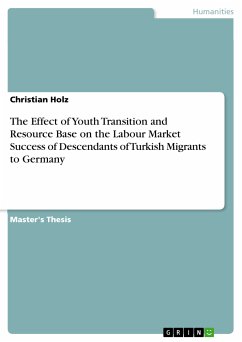Master's Thesis from the year 2018 in the subject Sociology - Work, Profession, Education, Organisation, grade: 1,3, , language: English, abstract: Objective of this paper is to find answers to the following research questions: 1. Do preferences, and to what extent, lead to variation in labour market success between women and men, within the group of women and within the group of men? 2. Can preferences explain the remaining of a pay gap between women and men? Furthermore, it makes the attempt to test the long-term effect of preferences and their proclaimed stability over the life course, try-ing to find answers to the questions: 3. If preferences persist over the life course and remain unaffected by labour market factors? And 4. If preferences at one timepoint influence the labour market success at the next time point? Inequalities in labour market success between women and men have often been topic of analysis in the social sciences, attributing differences to various factors like involvement in unpaid work, differences in occupation choice, job characteristics or responsibility for children. A new, but controversially discussed approach, is the so-called preference theory proposed by Catherine Hakim, who sees preferences regarding work and family as the mayor determinant of women's employment choices in the 21st century. Proceeding from earlier studies, this paper aims at enhancing the current state of research in three ways. First, in contrast to previous research, which relied on general attitudes to measure preferences, the utilised data set here, allows for the usage of items capturing actual prefer-ences measured as the importance of work and family for the respondents' own life. Secondly, this study does not only focus on women, but also includes men as a target group, an ap-proach which has been rather neglected in previous research. This offers the possibility to not only analyse differing effects of preferences on labour market outcomes within the group of women, but tests the same for men and further offers the possibility to compare women and men with one another, also with respect to the gender pay gap. Thirdly, this study focusses on Germany which, to my knowledge, was not yet object of an in-depth analysis regarding Hakim¿s preference theory and its connection to labour market success. .
Dieser Download kann aus rechtlichen Gründen nur mit Rechnungsadresse in A, B, BG, CY, CZ, D, DK, EW, E, FIN, F, GR, HR, H, IRL, I, LT, L, LR, M, NL, PL, P, R, S, SLO, SK ausgeliefert werden.









